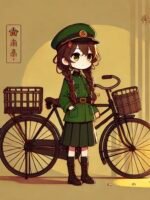Poverty Alleviation C60
by MarineTLChapter 60
As soon as they entered the village, they were stopped by professional beggars demanding money, making the county officials in charge of receiving the production team look visibly displeased.
But no matter how embarrassing the situation was, they had to grit their teeth and push forward! They had exhausted all possible connections to secure this opportunity with the production team, believing this might be the only viable path for Huazi Village to escape poverty.
After all, traditional poverty alleviation policies had been utterly ineffective here.
With no other options, they had to take an unconventional approach and pin their hopes on the production team’s “golden touch” to save this village.
“Minister Wang, there are so many professional beggars in Huazi Village. Our colleagues who came to scout the location were even robbed in broad daylight! Isn’t that already a criminal act? Hasn’t the county cracked down on this?” At this moment, Wang Qun felt like he had picked up a hot potato and was starting to regret his hasty agreement.
Deputy Minister of the County Propaganda Department, Wang Xuan, who was responsible for receiving them, gave a wry smile.
“Of course, we’ve cracked down. We sent two consecutive poverty alleviation officials, but they couldn’t make any progress on this poverty alleviation task. The county took it very seriously and launched four major crackdowns, arresting many criminals hiding in Huazi Village. Some of them were wanted for serious crimes and are still at large.”
“To be honest with you, the Huazi Village you see now is already the best result we could achieve after multiple crackdowns. They say poverty alleviation starts with changing mindsets, and while the remaining villagers aren’t committing major crimes, they just refuse to work for a living. Even our poverty alleviation officials are at a loss.”
Seeing Wang Qun and his team starting to hesitate, Wang Xuan feared they might turn around and leave. In his desperation, he blurted out the county’s real intentions—
“To be honest, when we signed Huazi Village up for this show, we never intended to dump the burden of poverty alleviation on the production team. That’s our job, not yours.”
“Our hope is that, as human beings, they still have some sense of shame. If they see their own disgraceful behavior on the show, maybe it’ll awaken their self-respect and make them willing to cooperate with our poverty alleviation policies. If that happens, the county will do everything in its power to help them out of poverty!”
Hearing this, what else could Wang Qun and his team do?
They were already here—there was no turning back now. They could only brace themselves and move forward.
The village secretary led them to a row of red brick houses near the village committee office.
This would be their accommodation for the next few days.
It was clear that these houses had been temporarily cleared out for them. Some small vegetable plants were growing near the door, and instead of glass, the windows were covered with transparent plastic sheets, haphazardly nailed in place. Various colors of marker scribbles were scrawled all over the plastic.
As they pushed open the door, a strange odor wafted out—a mix of unwashed bedding, clothes, and stale sweat.
Near the back wall, there was another window. A metal chimney protruded through the wall, and below it, a simple stove made of red bricks supported a blackened iron pot. Next to it, a makeshift countertop made of scavenged wooden boards held some scattered bowls and chopsticks. Some parts were clean, as if rinsed with water, but others still had leftover rice grains stuck to them, coated in a greasy layer that made it impossible to tell their original color.
They had mentally prepared themselves when they saw the exposed red bricks outside, assuming the interior would be just as basic. But once inside, they realized—this wasn’t just simple. It was like a more “advanced” version of a war-torn zone!
There weren’t even basic partitions inside! The more “refined” setups had a tattered mat hanging as a curtain between the living room and the bedroom. The cruder ones? They just stacked firewood between the living area and the sleeping space—that was their “wall.”
Beds? Forget about it. That messy pile of straw on the floor—that was the “bed.”
“The village conditions are rough. We apologize for the inconvenience,” Wang Xuan said awkwardly.
This time, the village secretary didn’t pretend to be oblivious, but what he said next was even more jaw-dropping—
“Uh, you all can stay here for the next few days, but it’s best not to move anything in the house. Just set things aside if they’re in the way. Otherwise, when the owners return and find things missing, they’ll cause a commotion in the village…”
Everyone was speechless.
Did they really think the production team would steal their broken bowls and tattered mats?!
This scene was later released as a behind-the-scenes clip, and fans were both shocked and amused. They joked that even Wang Baochuan, the historical figure known for enduring hardships, would have fled overnight from a place like this!
It was hard to imagine how young men from this village could possibly get married when they grew up.
Marriage?
Impossible.
Huazi Village hadn’t hosted a wedding in years. Not that there were no women in the village—sometimes, young beggars would bring back women they found while begging outside. Some were intellectually disabled, others had physical impairments like bad legs or blindness. As long as they were women and could bear children, that was enough—no need for a wedding.
Looking at the barren, makeshift dormitory, Wang Qun almost fainted. Under these conditions, they might as well pitch tents on the street—it would at least be more sanitary.
Honestly, just seeing that pile of straw reminded Wang Qun of his childhood in the countryside, when lice outbreaks were a common horror.
Luckily, their program had money now!
Since the villagers were also concerned about them touching their belongings and causing trouble later, Wang Qun immediately decided to rent several container dormitories!
The crew was moved to tears, gazing at their generous director with gratitude.
Happiness is all about perspective. Compared to these houses, those prefab worker dorms suddenly seemed cozy and appealing.
With accommodations settled, it was time to get to work.
The production team decided to start with Huazi Village’s original trade. If the villagers refused to grow flowers, surely someone would be willing to sell them instead?
“Our idea is this: In recent years, night markets and street vendors have been gradually making a comeback in various cities, right?”
The production team has secured a batch of charity stalls from our local urban management department, which can be used by villagers free of charge. We’ve calculated that with a three-shift schedule per stall per day, these stalls can provide over a hundred job opportunities.
“Selling flowers? That’s not a difficult business, but fresh flowers aren’t cheap, right? I’m afraid our villagers don’t have that kind of money,” the village party secretary sighed.
Wang Qun was well prepared and smiled as he said:
“We’ve considered that as well. Rest assured, the village won’t have to worry. Our sponsor, ‘Sannan Nursery,’ will provide flower materials worth about 200,000 yuan for the first batch of villagers participating in the street stall poverty alleviation program. This should be enough for each stall to operate for a week.”
“In other words, for the first week, everyone won’t need to spend their own money to buy flowers—it’s essentially a risk-free trial. If it works out, they can save up some money from selling flowers to use as startup capital. If it doesn’t, the villagers will only have lost a few days of their time.”
Such a great opportunity?
The village party secretary’s eyes lit up. Free stalls, free flowers—wasn’t this basically free money being handed to them?
As soon as the village loudspeakers blared the announcement, villagers rushed to sign up, filling up the open space in front of the village committee office in no time.
“Wei Sheng, you really know your stuff! How did you come up with the idea of using street stalls?” Watching the usually laid-back villagers suddenly become so active and motivated, Zhang Zexuan and the others were truly amazed.
They knew they could always count on their little Wei!
“It just came to me. Actually, begging and setting up a stall are quite similar—you just sit at a spot and wait, then shout out when someone passes by. Ahem~”
“Of course, there’s still a difference. Begging is essentially getting something for nothing, while setting up a stall at least counts as making an honest living, right?”
Everyone burst into laughter.
The livestream viewers watching also cracked up.
Especially those who had already turned to street vending due to unemployment—they all said they learned something new!
“This logic is 666! I’ve decided: if I have money, I’ll set up a stall; if I don’t, I’ll just beg. Either way, it’s just making a living on the roadside. o(╥﹏╥)o”
“Looking at my deserted little stall, then seeing the bustling beggars under the overpass, I suddenly fell into deep thought.”
“Hey, maybe you should just pack up your stall, grab a broken bowl from a trash can, and sit down. You might make more in one night than from selling stuff!”
“But isn’t it different? I feel like setting up a stall is at least more dignified than begging.”
“Now here’s the real question—if so many people are setting up stalls in the city, where will they sleep at night?”
Seeing the comments filled with concern about where the villagers would stay at night, Wei Sheng smirked and explained to the camera—
“We also considered that many villagers come from poor backgrounds and wouldn’t want to spend money on rent when they first arrive in the city. Plus, many rental properties require at least a three-month lease, which is a significant expense if they can’t keep the business going.”
“So, the production team has temporarily booked dormitory-style lodging in a few inns in J City. Everyone can stay there for the first month. After the adaptation period, if they don’t want to continue, they can return to the village without paying rent. Those who stick with it can find a place to rent together, and we won’t interfere with that.”
Hearing this, not just the villagers—many city workers were also envious.
“Don’t just focus on helping rural areas—there are plenty of struggling people in the cities too!”
With the economy struggling in recent years, many migrant workers in cities had lost their jobs. They were barely able to afford rent anymore—desperate for some assistance too.
This comment hit hard. Just a few months ago, wasn’t Wei Sheng also one of the unemployed? For graduates from second-tier universities, campus recruitment was practically a joke. If he didn’t want to end up in a factory assembling screws, he had to keep trying different job fairs and social recruitment.
At the time, his mother had even gone around asking for favors and giving gifts, hoping to secure him a contract position in a government agency. Thinking about it now, the urban poor really had it worse than those in the countryside.
No matter how poor rural areas were, at least people had houses and land to ensure they could eat and sleep. If they were lucky, they could even benefit from rural revitalization policies that provided funding and support for entrepreneurship… Sigh!
No wonder more and more young people were choosing to leave big cities and return to farming in the countryside.
Maybe their TV station could produce a new show specifically to help unemployed urban youth find jobs?
While the livestream was still covering the registration process, Wei Sheng handed his phone to Chen Mengjie and used the break to discuss this idea with producer Wang Yang.
“A workplace reality show? That’s been done before—the trend died out a long time ago,” Wang Yang hesitated.
If it were anyone else suggesting a workplace reality show, he would have shot them down immediately.
But since it was Wei Sheng… This kid had incredible luck. Wang Yang felt it might be worth listening to his idea. If they really managed to create another hit show, he’d have two top-rated reality shows under his belt. He wouldn’t have to worry about his career for years!
Master Persuader Wei Sheng stepped up again, eagerly selling his idea—
“Mr. Wang, I’m not talking about the old-fashioned, highbrow workplace reality shows. This would be something real—where we select a few representative young people from the applicants and genuinely help them find jobs.”
“I’ve watched those previous workplace reality shows. They just had professionals showcasing their careers and struggles, playing up the emotional angle and the chaos of young people entering the workforce… But tell me the truth, Mr. Wang, do you really think the audience connects with those shows?”
Wang Yang fell silent.
If the audience really connected, why didn’t those shows get a second or third season?
Clearly, Wang Yang had never gone through the brutal reality of job hunting. Then again, university graduates in his generation had it easy—guaranteed job placements, and if they were lucky, they even got assigned housing. Unlike recent graduates, whose degrees were practically worthless in the job market…
Wei Sheng silently mourned for three seconds for his generation of college students before continuing to enthusiastically persuade Wang Yang—
“President Wang, the job-seeking reality show I’m talking about isn’t like those high-end workplace reality shows where a bunch of HR representatives from prestigious multinational companies, dressed in luxury brands, scrutinize the résumés and internship experiences of top-tier university graduates.”
“Instead, it’s about genuinely helping ordinary university students from non-elite schools, as well as vocational school and technical school graduates, find jobs that truly suit them. They don’t necessarily have to land positions in big companies—realistic salaries are enough.”
“Think about it, how hard is it for young people to find jobs these days? Isn’t there a joke online that says the end of the universe is either food delivery or driving for Didi? (Similar to Uber)”
“When we create reality shows, do we always have to stay lofty and look down on the audience from above?”
“Why can’t we be more grounded and produce shows that actually reflect the lives of ordinary people? Let’s be honest—how many graduates from regular universities, vocational schools, or middle-aged unemployed individuals over 40 even get the chance to interview at big corporations? Forget the interview—many of them don’t even make it past the résumé screening!”
“Think about it, President Wang—only a small fraction of people can enter prestigious firms or investment banks. Even fewer make it into the public sector. The vast majority of unemployed people in society are just ordinary folks struggling to get by.”
“I believe that the real value of this show isn’t just in helping a few people find jobs, but in using the job-seeking process to give hope to more unemployed individuals. Maybe it will inspire them to explore different ways to make a living instead of just focusing on formal job postings from big companies.”
“Pfft—” Wang Yang imagined a TV crew leading a group of struggling job seekers around in search of employment. The idea was bittersweet, but oddly intriguing.
Thinking about it, if this show were to succeed, one thing was certain—it would have a solid viewer base. After all, as Wei Sheng pointed out, the job market had been tough in recent years, and the unemployment rate was indeed high.
Especially for young people—every unemployed young person had at least three family members worrying about their job search. If the show was done well, it wouldn’t just attract unemployed youth but also their concerned families, making them potential viewers as well.
The more he thought about it, the more excited he became. Wang Yang was already getting restless.
“Take your time to think about it, President Wang. I’m off to work!” Wei Sheng finished speaking and ran off.
If he didn’t escape now, Wang Yang might just pull him into drafting a full program proposal on the spot.
But he was a signed artist now!
Helping with show proposals?
That’s a separate fee, hmph~~
—
Outside the crowd, a tall, thin boy stood silently under a bare persimmon tree, supporting a blind old man as they watched the people signing up.
“Dong, let’s scrape together some money and return it to them,” the old blind man groped for the boy’s arm and patted it.
The boy pursed his lips stubbornly and said nothing.
“Why are you so stubborn? Listen to your grandpa! Go back, gather the money, and return it!” The old man stomped his foot in frustration.
The boy lifted his chin, his face set. “We can’t touch that money! It’s for your medical treatment!”
“Sigh! Why won’t you listen? How many more years do I even have left? Besides, if you and Xiao Xi can make money by setting up a stall, won’t you still be able to pay for my treatment?”
“And what if we can’t make money?” The boy was resolute—once he made a decision, no one could change his mind.
The old blind man was so exasperated he could die on the spot.
If Wei Sheng were here, he would have recognized this blind old man as the same beggar who had once teamed up with others to steal his and Zhang Zexuan’s backpacks.
This old beggar had lived a hard life—he had no children or family. When he was younger, he could still make a living telling fortunes under the bridge. But as he aged and illness took hold, he could only survive by begging on the streets.
The boy, Xiao Dong, had an unknown real name. According to what he had told the blind man, his birth mother had been severely beaten by his father in a domestic violence incident, coughing up blood before eventually dying. His father then remarried, and his stepmother, though kind-looking, was cruel at heart. Whenever his father was away, she tormented him—going as far as secretly burning his books and homework to stop him from going to school.
She would also frequently badmouth him in front of his father, leading to severe beatings.
Beaten to the point where he couldn’t bear it anymore, Xiao Dong, whose body was constantly covered in bruises, finally ran away from home. He wandered aimlessly, nearly falling into the hands of human traffickers who would have harvested his organs, but was ultimately taken in by the blind old man.
This child had a worrying nature. Despite his own suffering, he couldn’t stand seeing others in pain. Since being taken in by the blind old man, Xiao Dong had, in turn, taken in a fourteen-year-old boy named Xiao Xi, an eleven-year-old named Xiao Nan, and a still-nursing infant named Xiao Bei.
It was as if these children had a silent agreement to abandon their past identities. Once they arrived in their new makeshift family, they never spoke of their previous lives, their real names, or where they came from.
The old blind man, whose surname was Cao, had given them new names: Cao Dong, Cao Nan, and Cao Xi. The youngest, who had no say in the matter, was automatically named Cao Bei.
The old blind man had spent years sleeping under bridges. As he aged, his rheumatism and joint pain became unbearable, keeping him awake night after night. The children wanted to send him to a major hospital in the provincial capital for proper treatment and had been trying to save up for medical expenses.
Old Cao had long since given up on treatment. But one day, he noticed that the children were getting thinner. He kept an eye on them and soon realized that these foolish kids had been cutting back to only two meals a day. Worse, their food came from scraps picked out of restaurant waste bins, mixed with wild vegetables to make a thin soup.
Several times, they had fallen ill from eating rotten food.
Yet, they refused to spend even a single cent of the money they had saved for him. Every dime and nickel they earned, they hoarded away for his treatment.
Old Cao’s heart ached with anger. That was when he reluctantly agreed to work with Xiao Dong and the others.
Old Cao would stop cars and distract the drivers while Xiao Dong and the kids seized the opportunity to steal money from inside.
He knew this wasn’t sustainable. Sometimes, he even wished he’d just get hit by a car and die. That way, the four children would at least receive some compensation—and be rid of a burden like him.
Unfortunately, whether it was his own luck or the drivers’, despite stopping cars for so long, none had actually hit and killed him…
Who would have thought that the car they stole a few days ago belonged to a TV station?
And now, that same TV station was running a poverty alleviation project! Old Cao had already heard the village loudspeakers announcing that the project had no age or gender restrictions—any impoverished household in the village could sign up. The TV station would provide free stalls, and wealthy sponsors had even covered the upfront costs of purchasing fresh flowers. All they had to do was show up, and they’d be able to sell flowers in the city.
Back when Old Cao begged for food under the bridge, he had seen some poor kids selling flowers. A hundred yuan at the wholesale market could get them a huge bundle of discounted flowers, and once wrapped in decorative paper, a single flower could sell for several yuan. Though the business was tough, it was far more dignified than begging under the bridge.
Xiao Dong was already sixteen, plus fourteen-year-old Xiao Xi and eleven-year-old Xiao Nan—together, they could just about run a flower stall. If they added a few other items for sale, even if the stall was small, with effort, it could be enough to support the four children.
Most importantly, street vending didn’t have age restrictions. The stall was allocated by the urban management authorities, and they wouldn’t bully their own people—especially with the TV station watching. Who would dare mess with them?
If he could help the three kids establish themselves at the night market and run their stall well, even if they had to start paying rent in the future, they would at least have a stable livelihood. Even if he died immediately, the four kids would still have a way to survive.
Determined, Old Cao insisted that Xiao Dong return the stolen money to Wei Sheng and his friend. Otherwise, he feared that even if they applied for the program, Wei Sheng might hold a grudge and block their application.
Xiao Dong had no choice—Old Cao was even threatening to go on a hunger strike. What else could he do?
Luckily, they had saved all the stolen money. Xiao Dong withdrew the 2,000-plus yuan they had taken from Wei Sheng and Zhang Zexuan’s backpack, down to the last cent—he had kept careful track of it.
Wei Sheng never expected that, after all this time, he would actually get his stolen money back!
Xiao Dong ran off as soon as he returned the money. Wei Sheng had to ask the village party secretary about him to learn that the boy and his siblings were all adopted by the old blind beggar who had stopped cars. For a moment, he fell silent.
He wasn’t some saint who repaid evil with kindness, but he couldn’t bring himself to say no.
Kindness won over resentment. Wei Sheng secretly approached Wang Qun, hoping to make an exception for this “special family” and arrange for the three siblings to share a stall. This way, they could look out for each other and wouldn’t be bullied by adults because of their age.
Wang Qun, upon hearing about the family’s situation, immediately had a professional instinct kick in. “This is great material! If we film this, it’ll make for a compelling social issue discussion. Wei, what do you think? Should we—”
“It’s probably best not to,” Wei Sheng interrupted. “The village party secretary told me that Xiao Dong and Xiao Xi both ran away from their original homes. If we broadcast this, what if their families find them?”
“That’s true…” Wang Qun clicked his tongue in regret. Protecting minors’ privacy was a strict red line in television production.
Still, they had to help. Thinking about how these kids had no parents and were struggling alongside an old blind man, Wang Qun sighed and agreed. He arranged for Xiao Dong and his siblings to set up their stall in the university town night market.
Though it wasn’t as crowded as the Chenghuang Temple night market, the environment was safer—less complicated, with fewer troublemakers. It was a better place for kids to run a stall.
And so, in a small open area beside the university town’s commercial street, Cao Dong and his siblings got a stall about 1.5 meters long and 2 meters wide.
Cao Dong had a knack for business. With just this small stall, he planned to sell three types of products.
The first was free flowers. They didn’t need to worry about sourcing them—flower farms would deliver fresh blooms daily, and all they had to do was package and sell them.
The second category included handcrafted items made from grass beads and woven straw cages containing crickets they caught themselves. Cao Dong had seen street vendors selling similar items in the city—he knew urban kids loved them. Most importantly, these cost nothing to make.
They had planted grass bead vines (also known as grass Bodhi beads) in their yard. These beads, once strung, could be sold as bracelets. After discovering they had market value, Cao Dong and his siblings had collected a large number of seeds from the wild and planted them. They had already planned to sell the bead bracelets in the city, and now they could do so without even needing to rent a stall.
The final product was also practically free—loofah sponges, commonly used in rural households for dishwashing. Cao Dong had seen online that city folks liked using them as bath scrubs, and each one could sell for three yuan.
They had planted over a dozen loofah vines along the backyard wall, harvesting hundreds of old loofahs. After peeling, removing the seeds, washing, and drying them, they were turned into loofah sponges. He planned to sell them at five yuan for two, aiming for high turnover. If they made good money, he would rent a plot of land from the village next year and grow loofahs commercially!
The production team had been wrong about one thing: the villagers of Huazi Village weren’t lazy—they weren’t refusing to farm. The issue was that many families, like Cao Dong’s, consisted only of elderly people, disabled individuals, and children. Without money to rent farming equipment, how were they supposed to cultivate the land?










0 Comments